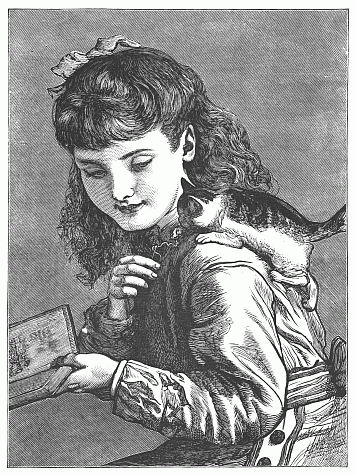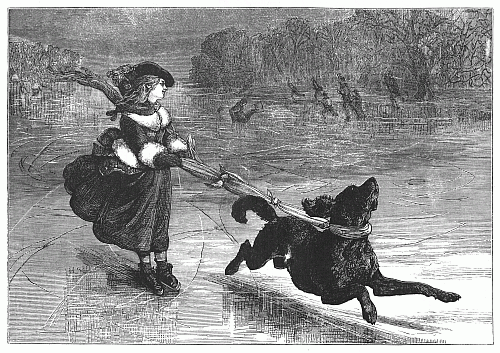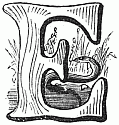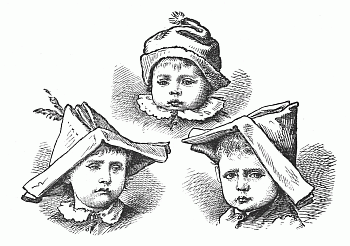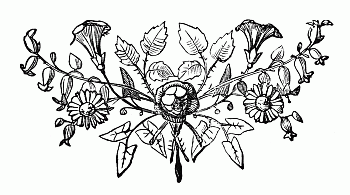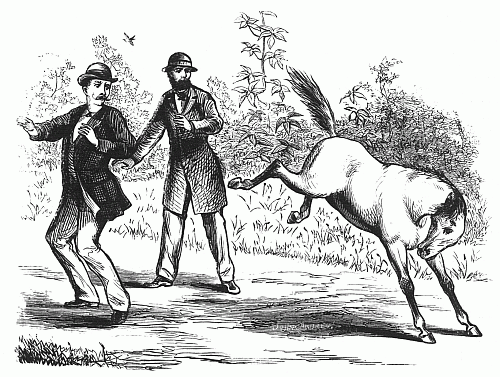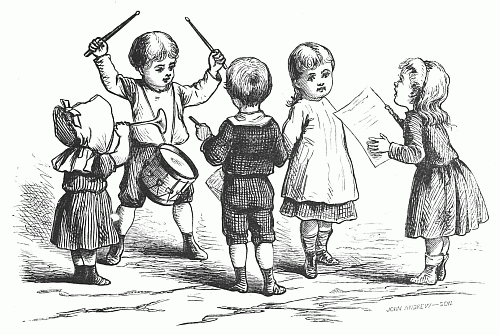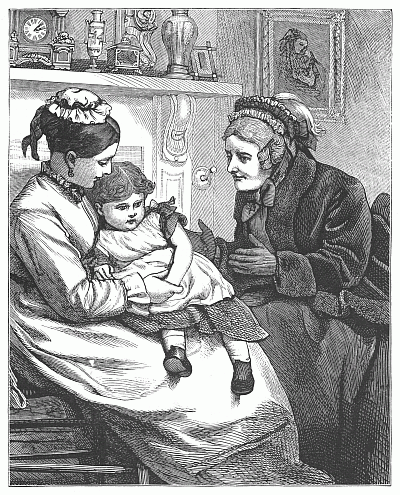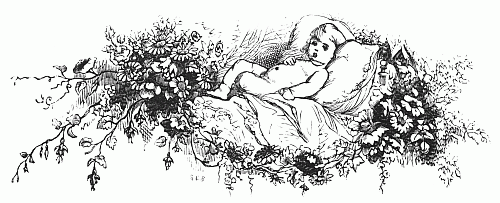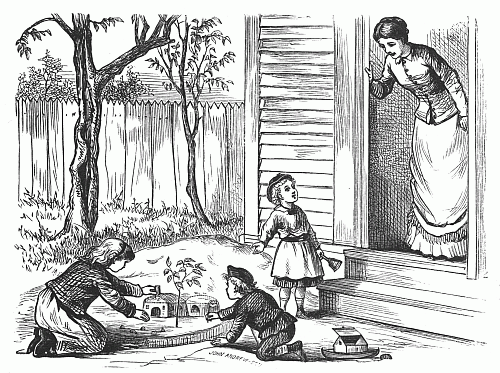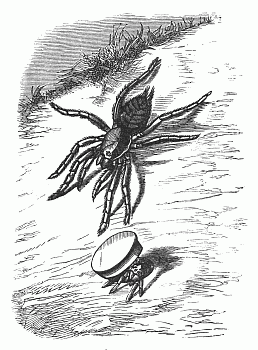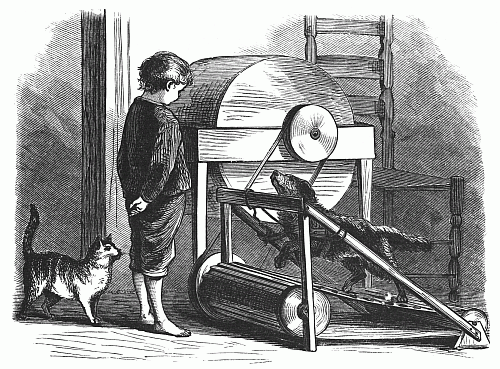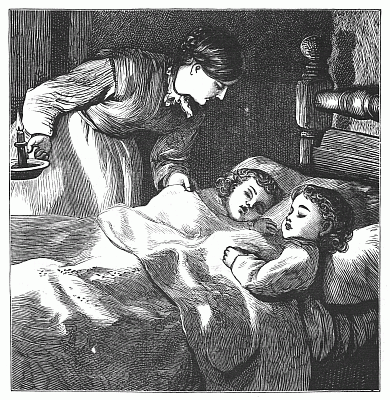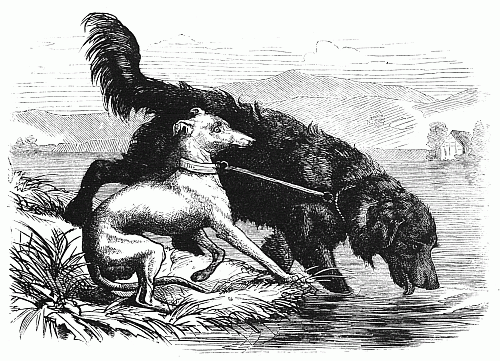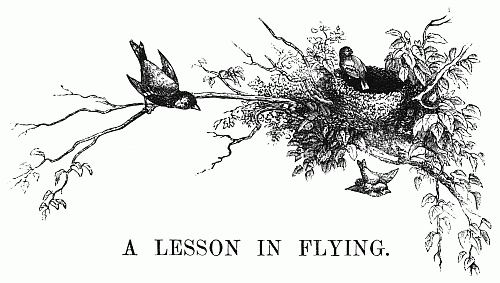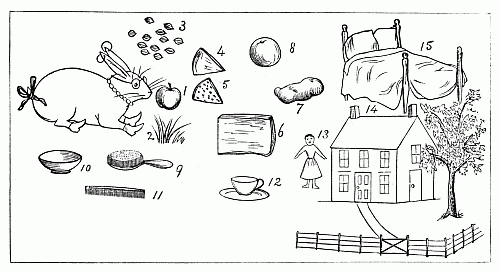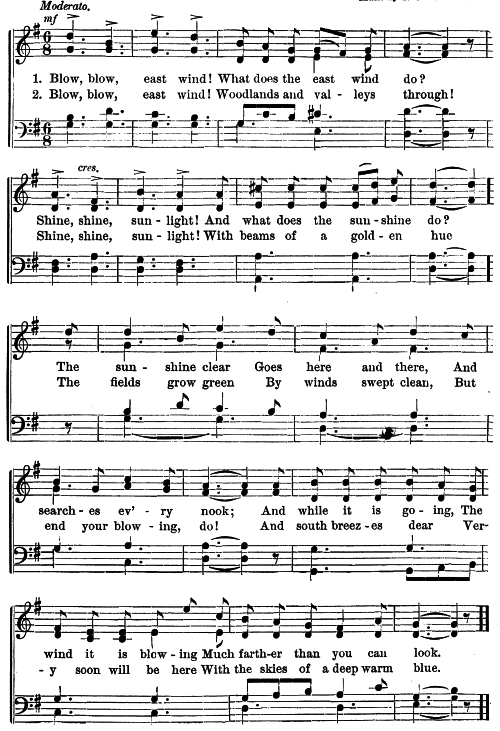Project Gutenberg's The Nursery, February 1878, Vol. XXIII, No. 2, by Various
This eBook is for the use of anyone anywhere at no cost and with
almost no restrictions whatsoever. You may copy it, give it away or
re-use it under the terms of the Project Gutenberg License included
with this eBook or online at www.gutenberg.org
Title: The Nursery, February 1878, Vol. XXIII, No. 2
A Monthly Magazine for Youngest Readers
Author: Various
Release Date: February 20, 2009 [EBook #28141]
Language: English
Character set encoding: ISO-8859-1
*** START OF THIS PROJECT GUTENBERG EBOOK THE NURSERY, FEBRUARY 1878 ***
Produced by Emmy, Juliet Sutherland and the Online
Distributed Proofreading Team at http://www.pgdp.net. Music
by Linda Cantoni.
THE
NURSERY
A Monthly Magazine
For Youngest Readers.
VOLUME XXIII.—No. 2.
Contents.
IN PROSE.
| | PAGE |
| Ebony and Lucy | 34 |
| Daisy | 37 |
| My First Attempt at Fishing | 40 |
| New Method of Catching Mice | 43 |
| Jamie Canfield's Sand-Heap | 45 |
| Dick's Dream | 47 |
| Drawing Lesson | 49 |
| Romeo the Shirk | 51 |
| Tied Not Mated | 54 |
| My Kitten | 56 |
| A Lesson in Flying | 58 |
| How Little Edith Went to Sleep | 62 |
IN VERSE
| | PAGE |
| The Terrible Trio | 35 |
| Shy Little Pansy | 41 |
| A Song for Baby | 44 |
| Three Little Chicks | 50 |
| Mother's Last Look | 53 |
| "Lullaby!" | 60 |
| Blow, Blow, East Wind (with music) | 64 |
[33]
[34]
EBONY AND LUCY.
BONY is the name of Lucy's black dog. I will
leave you to guess why he is so called.
On a bright, cold winter day, when no wind
was stirring, and the ice of the pond was
smooth as glass, Lucy went out, followed by
Ebony. Such joyful barking as there was!
Her father knew that the good dog would pull her out of
the water, if the ice should break through. But the day
was so cold, there was little danger from thin ice.
A bright idea occurred to Lucy when she had put on her
skates. She had scarfs and handkerchiefs with her, and,
tying three or four of these together, she made a noose,
which she threw over Ebony's head. Thus she held him, so
that he could pull her on her skates over the ice.
"Now, Ebony, let us see how fast you can go," said Lucy.
Ebony started at a full gallop; and she began to sing,—
"We issue no tickets, we close no gate,
We blow no whistle, and nobody's late;
Our train is off as soon as we're in it;
We go at the rate of ten miles a minute,
(And that is six hundred miles an hour!)—
For ours is an engine of one-dog power;
But that dog's Ebony, bold and fleet,
A dog, you'll find, that is hard to beat:
So look out, stragglers and tramps! I guess
You'd better not trifle with our express!"
Hardly had Lucy finished her song, when Ebony, who
had been going at great speed for some distance, slipped on
his haunches, where the ice was very smooth, and, sliding
along, fell over on his side.
Lucy fell too, but she was not hurt. "You good Ebony,"[35]
said she. "You have done well. But it is too bad to
make you play the part of a locomotive engine. And
so, old fellow, I will take off your harness, and let you go
free."
Then Lucy took the scarf from the dog's neck, and darted
off alone on her skates to a part of the pond where her
brother Felix had just had a tumble on the ice.
But Ebony would not forsake her. He kept close at her
heels; for he knew there was water underneath the ice,
and he meant to be near at hand, should any accident
happen. I am glad to say, that, after a good frolic on the
ice, they reached home safely in time for dinner.
Uncle Charles.
THE TERRIBLE TRIO.
These are the robbers,—the terrible three!
In showing no mercy they all agree;
They fill the woods with their war-whoops dire:
[36]Policemen and soldiers, beware, retire!
Rinaldo's the name of the captain: you learn
His rank from his cap, and his frown so stern.
The next is Grimaldi, a desperate fellow!
His eyes they are blue, and his hair it is yellow.
The youngest but dreadfulest of them all
Has a terrible name that I cannot recall:
'Tis hard to pronounce; and it's well, perhaps,
That memory here has suffered a lapse.
Oh! doesn't it make you all shudder to look
At their likenesses even, all here in a book?—
Rinaldo the fierce, and Grimaldi the grim,
And that young, nameless bandit, so bold and so trim.
But if you should meet with this terrible band,
Now don't run away, but come quick to a stand:
Be humble and quiet, and don't act amiss,
And all that they'll rob you of, will be—a kiss!
Ida Fay.
[37]
DAISY.
A friend of mine, Mr. S., had a beautiful colt named
Daisy, who was the pet of all the family. She was so tame
she would put her head in at the open windows to see what
was going on in the house; and very often, when she saw
the front-door open, she would go up the steps of the
piazza, and deliberately march into the hall. No one ever
struck Daisy with a whip, or even a switch. A little slap
of the hand, and a "Go out, Daisy," were all that were
necessary.
Mrs. S. had a new cook; and one day she set a pan of
custard on the back-porch to cool. When she went out to
get it, an hour or two after, she found nothing but the empty
pan. Molly ran to Mrs. S. in great distress, and told her of
the loss of the custard. "Ah!" said Mrs. S., "then Daisy
has eaten it." And, sure enough, Daisy was the thief.[38]
Another time the naughty colt put her head in the kitchen-window,
and ate up some apple-pies that were on the table.
All this was very bad indeed, but Daisy was always forgiven
because she was so lovely and gentle. She would follow
any of the family about the grounds, and rub her head
against them to show how much she loved them.
One day a man came to Mr. S.'s house to make a visit.
He was not in the habit of visiting the family, and so had
not made Daisy's acquaintance. After tea, Mr. S. and his
visitor were standing on the piazza, when Daisy came trotting
up, as she always did when she saw one of the family
there, and opened her mouth, expecting Mr. S. to put a
piece of bread or apple in. The stranger did not understand
this little trick, and (coarse man that he was!) spat a
quantity of tobacco-juice into Daisy's face. Poor little
Daisy! She hung her head down, and walked off under the
trees, where she stood looking very miserable.
The next morning Mr. S. asked his visitor to walk with
him through his grounds; and, as they were walking along,
they passed a place where Daisy, who still looked as if she
felt insulted and injured, was quietly grazing.
As soon as she saw her enemy (as she must have considered
him), she pricked up her ears as if some happy idea
had come into her head. She gave herself a little shake,
and, walking behind him until she was quite near, suddenly
wheeled around, and gave a kick that would have broken
some of his bones, if he had not jumped out of the way just
in time to escape her heels.
As it was, he was very much frightened, and looked very
mean; for he knew that a kick was just what he deserved
for his vulgarity and insolence.
Daisy had never been known to kick at anybody before,
and she never kicked anybody afterwards.
A.
[39]
THE FAMOUS MOZART BAND.
The famous Mozart Band, as everybody ought to know,
was formed in our village. It has serenaded almost every
family on the street; and there is no end to the money (in
the form of beans and smooth stones) that has been poured
into the hat carried round by Miss Amy, the youngest
member.
The band is composed of five members, whose names are
Charles, Edwin, Susan, Bella, and Amy. Charles was the
founder of the band. While on a visit to his uncle in the
city, he had seen a strolling band of men in the street, who
played finely on trumpets and flutes. He resolved to form
a band at home, and to call it the Mozart Band.
But why call it the Mozart? Well, Mozart was a wonderful
musical genius, who could compose music when he
was five years old, and who astonished all Germany by his[40]
skill and aptness as a performer. So Charles decided on
calling his band the Mozart Band.
At great expense I have obtained a drawing of the members
of the Mozart Band. Charles (first drum) is the leader;
Edwin (second drum) is next in rank; Amy (trumpet) is
the next, for she owns the trumpet, and so comes before the
other two ladies, who are merely vocal performers, by which
I mean singers.
Now, if you want to hear the famous Mozart Band, you
must come to our village. Performances take place every
Wednesday and Saturday afternoon, and sometimes oftener.
If you come, you must bring some money to put into Amy's
hat; for the band cannot afford to play for nothing. They
are getting to be so famous that I should not wonder if they
were to have an invitation soon to come on to New York
or Boston, and give a concert in one of the large halls.
Aunt Cecilia.
MY FIRST ATTEMPT AT FISHING.
When I was seven years old, my father took me down to
the river to fish. I had a nice new line, and a little hook
that I bought of a peddler the week before. My father cut
me a pole from the woods near by; and I caught a grasshopper
for bait.
I tried to put the grasshopper on the hook, but I pricked
my finger: so my father put it on for me. Then I threw
in my line, and kept moving it up and down.
Pretty soon I thought I felt a bite, and called out to my
father, "O father, I've got a fish!" I pulled it up, and
what do you think I had caught? You could not guess in
a week. It was my sister's old rag baby.
Frank Lynn.
[41]
SHY LITTLE PANSY.
"
Why so shy, my Pansy,
Tell me why so shy?
Mother's arms are round thee;
[42]This is grandma by.
She can tell you stories
Of the time, my dear,
When she was a little girl
Just like Pansy here.
"Once there was a dolly,
And its name was Bess;
Grandma then, like Pansy,
Was—how old? Now guess!
Just the age of Pansy!
Well, one night, you see"—
"Grandma," said the little girl,
"Take me on your knee."
Pansy's shyness melted;
Grandma won the day:
Now hugged tight in grandma's arms
Little Pansy lay;
And she heard a story
Of a doll so fine,
Left out on the cold, cold ground,
Where no sun could shine.
And the snow fell slowly,
Softly fell, like down,
Till a heap of drifted flakes
Covered dolly's gown.
Yes, it hid and covered
All the bright blue dress,
Then her hair and rosy cheeks—
[43]Poor forsaken Bess!
Dolly's little mother
Hunted for her child;
But no trace of her was seen
Till the air grew mild.
When the snow was melted,
There was dolly found,
With her silken dress all soiled
On the muddy ground.
Emily Carter.
NEW METHOD OF CATCHING MICE.
Perhaps some of your youthful readers will be glad to
know how I catch mice. If you think so, you are at liberty
to publish the following; for I do not intend to apply for a
patent.
One evening last week we made some molasses candy;
and, as too much of it, eaten before going to bed, is not good
for the teeth, I spread some on a baking-tin, and set it away
to cool for the next day.
It was not cooked enough to harden thoroughly; and a
little mouse had the curiosity to taste it; but, the moment
his feet touched it, they stuck fast, and he could not get
away.
His cries for help brought two other mice to his assistance;
but they shared the same fate, the molasses candy
holding all three prisoners.
When I found them the next morning, all three were
stuck fast. This shows what a useful thing molasses candy
is to have in a house, and is a warning to all mice not to
meddle with it.
Arthur F. Corbin.
Gouverneur, N.Y.
[44]
A SONG FOR BABY.
Nuts for all the baby-birds
In the merry budding spring;
Roses, where the dusty bees
May sip and cling.
Shade for all the pretty lambs
That in the summer stray;
Hedges, where the crickets chirp
Their time away.
Holes, where nimble squirrels hide
When autumn hours are chill;
Heaping barns, where horse and cow
Have shelter still.
Homes for rabbit, mouse, and mole,
When winter strews the ground;
But mother's arms for baby dear
The whole year round!
George Cooper.
[45]
JAMIE CANFIELD'S SAND-HEAP.
Jamie Canfield is a three-year-old boy who lives in
Lawrence, Kansas, the prettiest town in the State. He and
Freddy Bassett, a four-year-old neighbor, love to play in
the dirt; and their mammas allow them to do it, because it
is so healthy.
It certainly has proved to be so in Jamie's case; for he
was quite pale and delicate in the spring, and now he is
brown and rugged, and ready to eat all the food he can get.
But dear me! he used to get so dirty!
What was the use of washing him, and putting on clean
dresses and aprons, when he was constantly throwing aside
his other playthings, and making mud pies, or carting earth
in his little red wagon?
His papa laughed and said, "Oh, never mind! Dirt is[46]
good for him." But mamma thought it was not very good
for his clothes; and, besides, she wanted him to be clean
enough to kiss without being washed every time he came
into the house.
So she said one day to his papa, "James, I think it
would be a good idea to get a load of sand for Jamie to play
in. It will at least be cleaner than that dust-heap."
That very day up came a load of yellow, shining sand.
It was heaped into a shady corner by mamma's bedroom-door,
and Jamie and Freddy dived into it at once.
They made pies; they dug holes, and filled them with
water for wells; they made mountains with caves in their
sides, and every thing else they could think of. When
dinner-time came, Jamie had to be coaxed away from his
sand-heap; and mamma said she believed he would sleep
in it, if he were allowed to.
After dinner, as soon as he waked from his nap, he went
straight to his sand again. Freddy was there before him;
and soon Minnie Rich, a little girl eleven years old, came
out, and played with them.
She knew how to work sand better than any of them.
First she wet it. Then she made a house with holes in the
sides for doors and windows, and a chip for a chimney.
Then she made a smooth lawn in front of the house, and
some hills and valleys in the rear, fenced in a yard, and set
out some flowers.
The boys were delighted; and mamma went to the door
more than once to look at the plantation, as Jamie called
it, before it was finished. It was really quite a pretty
thing, and Jamie declared his intention of keeping it just as
it was. But the hot sun dried the sand, so that the house
crumbled away; and the two boys were soon digging and
shovelling in their own way as before.
Jamie's Mamma.
[47]
DICK'S DREAM.
"Yes, step right down upon me, and kill me, if you
like," said Mrs. Tarantula to Dick, as they met at the schoolhouse
door. "This is a hard world, Dick Adams, and I am
about tired of living in it.
"You don't know what a fine home I once had! It was
in that clay mound; and, when I had dug me a hole fully a
foot deep and an inch across, my jaws and my eight legs
were quite tired out. I left some small stones on the side
for stairs: I lined the hole with brown silk next to the dirt,
and with white satin inside, both of which I spun and wove
on the spot.
"My nice round lid fitted so snug and even, that I thought
no one but myself ever could find my house. But, last
week, your brother Will's sharp eyes spied the round ring[48]
that marks my nest; and he went and tore the lid from its
hinges, and left my hundred and ten children without a roof
to cover their heads. How I would like to bite that boy!
"I found the lid, and tried to fasten it down again; but
a heavy shower came up, and I could not fix it in the rain.
Then my husband came over from his house. You know
our husbands never live with the rest of the family. They
are too cross and get too hungry at times.
"We were not on very good terms; for, some time before,
when he thought I was away from home, he tried to get
into my house. I heard him, and, running up stairs, I put
my claws in the two little holes in the lining of the lid, and
braced myself so that he could not pry open the lid. He
said he only wanted to pay me a visit; but I knew he was
hungry, and wanted to eat up our children.
"But now he spoke very kindly to me, and told me that
my lid could not be fixed on; but, as my children were now
old enough to care for themselves, I had better go home
with him. I went to his house to talk it over and forgot to
give the children their supper, and tell them to work for
themselves after this.
"My husband told me a few days after that my boys and
girls got into a fight, and, before they quit, ate each other
up; but he was away from home for two days, and looked
very full when he came back.
"He may have told the truth; but I can't see how one of
my little ones could eat the other one hundred and nine,
and then swallow himself too."
This is what Dick Adams dreamed that a tarantula said to
him. He had seen one on his way to school, and what the
teacher told him about the insect had interested him so
much that he found himself dreaming about it all night.
C. M. Drake.
San Diego, Cal.
[49]
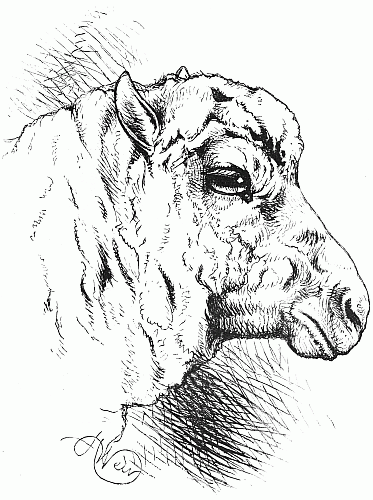 DRAWING-LESSON BY HARRISON WEIR.
DRAWING-LESSON BY HARRISON WEIR.
[50]
THREE LITTLE CHICKS.
Three little chicks, so downy and neat,
Went out in search of something to eat:
Ter-wit, ter-weet!
Something to eat!
And soon they picked up a straw of wheat.
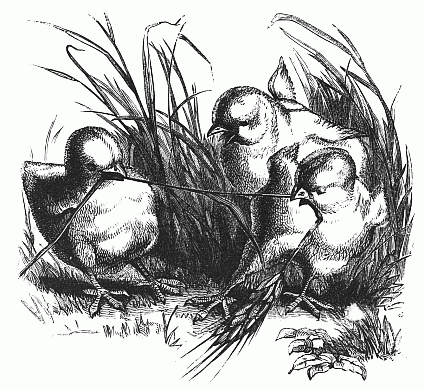
Said one little chick, "That belongs to me!"
Said the other little chick, "We'll see, we'll see!"
"Ter-wit, ter-weet!
It is nice and sweet,"
Said number three: "let us share the treat!"
One little chick seized the straw in his bill,
And was just preparing to eat his fill,
When the other chick
Stepped up so quick,
[51]He hadn't a chance for a picnic pick.
They pulled, and they tugged, the downy things;
And, oh, how they flapped their baby wings!
"Ter-wit, ter-weet!
Something to eat!
Just please let go of this bit of wheat!"
Fiercer and fiercer the battle grew,
Until the straw broke right in two,
And the little chicks
Were in a fix,
And sorry enough for their naughty tricks.
For a saucy crow has watched the fight,
And laughs, "Haw, haw! It serves you right!"
So he snatches the prize
From before their eyes,
And over the hills, and away, he flies!
Josephine Pollard.
ROMEO THE SHIRK.
Sixty years ago, when grandpa was a boy, he had a dog
called Romeo, who was made to do the work of churning
butter. I never saw a churn that went by dog-power; but
it must have been a clumsy affair.
The task could not have been an agreeable one, and I do
not wonder that Romeo did not like it. One morning, when
the churn was taken out, and the cream was all ready to be
made into butter, there was no Romeo to be found. Long
and loud were the calls made for him; but he did not
answer to his name.
The churning was done that day without his help. Nothing
was seen of him until just before dark, when he came[52]
into the house with the air of a prodigal son. He did not
walk up like an honest dog to get his supper, but slunk
under a table.
The family had agreed to neither chide him nor caress
him; but grandfather, who was then a little boy, slyly
carried him some supper. Romeo ate it greedily, but
looked unhappy all the time as though he knew he had done
wrong. It was plain that his conscience was smiting him.
The next week, when churning-time came, Romeo did not
try to get away. He stood by watching while the cream
was made ready; and, when his master whistled for him to
take his place at the churn, he came forward, wagging his
tail, as much as to say, "I am not going to be a shirk. I
was not half so happy the day I ran away as I should have
been if I had done my work cheerfully. I will never be
caught shirking again." And he never was.
Daisy's Mamma.
[53]
MOTHER'S LAST LOOK.
They're asleep,
So I'll keep
Very still, and peep:
Not too bright,
Candle-light
Is for them to night.
Saturday
Makes them gay,
And they've had their play:
Sled and shout
Have, no doubt,
[54]Tired them fairly out.
Once in bed,
Prayers were said
By each curly-head:
But, before
Half was o'er,
They saw slumber-shore.
Darlings! may
Angels stay,
Bless and for you pray!
May their love,
Like a dove,
Watch you from above!
Emily Carter.
TIED, NOT MATED.
One fine summer day, Master Fritz took his mother's
greyhound, Leda, and his father's spaniel, Neptune, out for
a run. They were quite ready for a frolic, for they had
been tied up in the barn all the forenoon, and had been
longing for Fritz to come.
So off they went; and, after they had gone some distance,
Fritz thought it would be fine fun, as he had in his pocket a
piece of string, to tie the two dogs together, and play they
were a span of horses.
No sooner had he got them well tied than some one called
him, and off he ran, leaving the two dogs tied, but not
mated. They roamed about a while over the fields and
meadows, till they came to the pond.
Now, the dogs could not talk in our language; but they
made certain noises, which meant, I think, just this: "Here's
a chance for a fine swim!" cried Neptune. "Come, Leda,
the water is nice and cool."
"I'd rather not go in," said Leda. "I'm not a very
good swimmer, and I easily take cold. Pray don't drag
me in. Come back and have a race in the meadow."[55]
"Oh, it's too fine, too fine!" barked Neptune; and he
began to lap up water with his tongue.
Leda pulled back, and cried, "Oh, don't!"
But the temptation was too great for Neptune. In he
pulled poor Leda, and swam about with her till she was
chilled through.
Fritz's father, Mr. Pitman, passing that way, saw the dogs,
and called them out. Glad enough was Leda to get on dry
land. She shivered; but Neptune shook himself till he
drenched her all over.
Then Mr. Pitman untied the dogs, and, taking some dry
grass, gave Leda a good rubbing till she felt warm and
brisk.
Then she began to bark at Neptune, and to caper round
him, as much as to say, "Did you not serve me a pretty
trick, sir? But I shall not let Master Fritz tie me to you
again. Never, never!"
Alfred Selwyn.
[56]
MY KITTEN.
I want to tell you about my
kitten, and some of her funny
ways. She is black and white,
and her name is Beauty.
I have great sport making
her run up and down the room
after my ball. But a little piece
of string is the best plaything
for her. She will jump right up
on my shoulder to catch it.
If I throw a newspaper on
the floor, she will jump upon it,
and tear holes in it, making
believe that she hears a mouse
under it. This she seems to do
to amuse me; for, as soon as I
stop looking at her, she will go[57]
away and lie down. But she is
growing fast, and soon will be
a grave old cat.
Viola Day.
[58]
Birds have their trials as well as little boys and girls.
To be sure they don't have to stand in a line, and shout
"Twice one are two" at the top of their voices; but they
have to learn to fly, and I think it very likely that they
take singing-lessons, although I am not sure as to that.
One day last summer I was picking flowers in the woods,
when, happening to look up, what should I see perched on
a twig just in front of me but a cunning little bird!
At first I kept very quiet, lest I should frighten him away;
but, as he showed no sign of moving, I ventured nearer and
nearer, until I even covered him with my hand.
"Why, dear me! he's nothing but a baby-bird, and can't
fly," I said to myself; and then I sat down on a mossy
mound near by, and waited; for I knew the mother-bird was
not far off, and I wanted to see what was going on.
It was not long before I heard a gentle whirr in the leaves
overhead, and, looking up, saw two birds circling around the
twig, but at some distance above it. Then one of them,
the mother, of course, drew nearer and nearer in smaller
and smaller circles, at the same time calling to her baby in
encouraging little chirps.
Birdie on his perch seemed very much excited, turning[59]
his head from one side to the other in the cunningest way.
But when his mother came close to him, only to dart off and
call on him to follow, he looked so disappointed that I really
felt as if I must comfort him.
The mother came back very soon and resumed her lesson
in flying, and very hard work she found it too, for the little
fellow was timid and refused to follow her, in spite of all
her coaxing and scolding. After working a long while, she
flew off, leaving her baby trembling on his perch. I pitied
the poor little fellow, he seemed so forlorn and helpless.
The little bird, left to himself, got tired at last of staying
where he was, and made one or two efforts to fly. He
flapped his wings, rounded up his back until he looked like
a ball of down, and leaned forward, as much as to say,
"I'll do it now." But when he saw the awful distance
between himself and the ground, his courage failed him, and
he clung to his perch more tightly than ever.
After a while the mother-bird came back, bringing a large
bug which she used as a bribe for her timid birdling, holding
it under his very bill, and then darting off in the hope that
he would follow. The youngster chirped for the bug, but
he would not fly for it; and, after many efforts, the old
bird, unable to resist his pleading, perched on a twig just
beneath him, and held up the bug, which you may be sure
he was not slow to seize and eat.
The little fellow now seemed to make up his mind to fly,
even if he died in the attempt. He flapped his wings,
rounded his back, and leaned forward as before, while the
mother-bird flew about, fluttering and chirping to such an
extent that the father came down from the top of a high
tree to see how they were getting along.
The little bird was just about to fly, and I was just ready
to clap my hands in applause, when, lo! there he was clinging[60]
to his perch again, trembling with fear, and chirping,
"I can't do it. I dare not. Oh, dear!"
The two old birds flew away much disappointed; but the
mother soon returned with another bug, and the lesson was
repeated. Indeed it was repeated so many times, that I
began to lose patience with the little coward, and to be full
of pity for the poor tired mother.
His birdship had just eaten a bug, and the parent-birds
were chirping and flying around, when, with the hope of
helping them in their labors, I stepped forward, and tapped
him on the bill with a flower-stem. The blow was so sudden
and unexpected, that, before he had time to think, he
lifted his wings and flew to a neighboring twig, where he
clung, frightened and delighted at what he had done.
I left him then, with his father and mother making just
such a time over him as your fathers and mothers made
over you when you took your first steps.
Mabel Elwell.
"LULLABY!"
Now the shadows gather fast, "by-low" time has come at last;
Little birds have gone to rest, safe within their downy nest;
Little lambkins seek the fold, warmly housed from wind and cold:
Baby darling, you and I now must sing our lullaby!
I will sing a sweet good-night to my baby's blue eyes bright,
To the little cheeks so fair, to the sunny, golden hair,
To the rosy lips so sweet, to the dimpled hands and feet;
Gently rocking to and fro, singing softly, singing low.
Into "Dreamland," baby wee, you will slip away from me;
[61]Out from shadow into light, to the world of visions bright;
While the mother-love so true, keeping tender watch o'er you,
With the lullaby shall seem still to soothe and bless your dream.
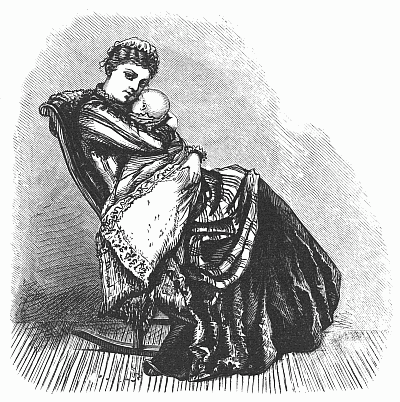
Lullaby, oh, lullaby! stars are lighting in the sky;
All the sunshine of the day like yourself is tired of play:
Tell me, are the sunbeams there in that dreamland bright and fair?
Bring them back, my baby, then, when you wake to earth again.
Sweetly on her mother's breast sinks the little one to rest.
By-low time is sweeter far than all the hours of play-time are:
So thinks baby, so think I, as we sing our lullaby,
Rocking gently to and fro, chanting softly, chanting low.
Mary D. Brine.
[62]
HOW LITTLE EDITH WENT TO SLEEP.
"I'm sleepy; and I want my mamma to rock me to sleep;
and I don't want grandma, or auntie, or papa, or any one
else, to rock me, but just my own mamma." And the little
queen planted her feet firmly, and looked at us with so much
defiance, that we felt it was of no use for us to coax, rock,
or sing.
Little Edith was tired, and sadly in need of her nap; but
her mamma was sick in bed, and could not be disturbed.
What was to be done?
Papa held up a bright silver-piece as a reward of merit to
the little girl, if she would be good, and go to sleep. Grandma
ventured a little coaxing. But it was all of no avail: the
sleepy eyes opened wide, as if they meant to keep open in
spite of us all.
But when auntie remarked that she was going to her
room to sharpen her pencil, and draw some pictures of a
cat, or a dog, or a rabbit, Edith's eyes brightened; and she
said, "Let me go too?"
So Edith sat on her auntie's lap, and asked her to draw a
rabbit,—a "yabbit," Edith called it,—and to begin at his
ears.
"Yes, little pet. Here are his ears, and here is his body,
and here is his tail, and here are his feet, and here are some
spectacles for him to see through," said auntie, drawing
each article as she named it. "And here are some pretty
red beads around his neck, and some rings in his ears; and
now we will tie a nice blue ribbon on his tail." Here Edith
suggested shoes for his feet.
"Yes," said auntie. "And now he wants an apple to
eat: so here is an apple for him (1). Now he wants some
grass (2); now some nuts (3). Now he is crying for a piece[63]
of pie (4); no, he doesn't want that kind, he wants gooseberry-pie:
well, rabbit, here it is (5). Here is some bread
for him (6), and we will spread it with nice butter; and he
wants a potato too (7), and a nice sweet orange (8), and
a brush to smooth his fur (9)."
Little Edith's eyes were gradually closing; but, becoming
aware of the fact, she started up as if she thought of going
away.
"Stop, darling," said auntie. "We must give the rabbit
a wash-bowl to wash in (10), and some nice cool water in
it; and now he must have a comb (11), and a cup and
saucer to drink his tea from (12), and a doll to play with
(13). Now he says he wants a house to live in (14), with a
tree growing by it, and a nice walk to the front-door, and
a fence all around it; and there he is crying for a bed to
sleep on. Oh, what a rabbit you are! you want so many
things! Well, here is a nice bed for you (15). Now I hope
you will go to sleep, and not ask for another thing; for
little Edith's eyes are shut."
And, sure enough, Edith was fast asleep.
C. L. K.
[64]
BLOW, BLOW, EAST WIND!
Music by T. Crampton.
[Transcriber's Note: You can play this music (MIDI file) by clicking here.]
1. Blow, blow, east wind!
What does the east wind do?
Shine, shine, sunlight!
And what does the sunshine do?
The sunshine clear
Goes here and there,
And searches ev'ry nook;
And while it is going,
The wind it is blowing
Much farther than you can look.
2. Blow, blow, east wind!
Woodlands and valleys through!
Shine, shine, sunlight!
With beams of a golden hue
The fields grow green
By winds swept clean,
But end your blowing, do!
And south breezes dear
Very soon will be here
With the skies of a deep warm blue.
Transcriber's Note:
The title page and table of contents were created for this issue following
the pattern from the 1877 issues.
Page 48, comma removed from text. The original read (said, he only)
Page 63, end quotation mark added (his fur (9).")
On the midi, last bar, bass staff, first chord changed from E-G to G-B.
End of the Project Gutenberg EBook of The Nursery, February 1878, Vol. XXIII,
No. 2, by Various
*** END OF THIS PROJECT GUTENBERG EBOOK THE NURSERY, FEBRUARY 1878 ***
***** This file should be named 28141-h.htm or 28141-h.zip *****
This and all associated files of various formats will be found in:
http://www.gutenberg.org/2/8/1/4/28141/
Produced by Emmy, Juliet Sutherland and the Online
Distributed Proofreading Team at http://www.pgdp.net. Music
by Linda Cantoni.
Updated editions will replace the previous one--the old editions
will be renamed.
Creating the works from public domain print editions means that no
one owns a United States copyright in these works, so the Foundation
(and you!) can copy and distribute it in the United States without
permission and without paying copyright royalties. Special rules,
set forth in the General Terms of Use part of this license, apply to
copying and distributing Project Gutenberg-tm electronic works to
protect the PROJECT GUTENBERG-tm concept and trademark. Project
Gutenberg is a registered trademark, and may not be used if you
charge for the eBooks, unless you receive specific permission. If you
do not charge anything for copies of this eBook, complying with the
rules is very easy. You may use this eBook for nearly any purpose
such as creation of derivative works, reports, performances and
research. They may be modified and printed and given away--you may do
practically ANYTHING with public domain eBooks. Redistribution is
subject to the trademark license, especially commercial
redistribution.
*** START: FULL LICENSE ***
THE FULL PROJECT GUTENBERG LICENSE
PLEASE READ THIS BEFORE YOU DISTRIBUTE OR USE THIS WORK
To protect the Project Gutenberg-tm mission of promoting the free
distribution of electronic works, by using or distributing this work
(or any other work associated in any way with the phrase "Project
Gutenberg"), you agree to comply with all the terms of the Full Project
Gutenberg-tm License (available with this file or online at
http://gutenberg.org/license).
Section 1. General Terms of Use and Redistributing Project Gutenberg-tm
electronic works
1.A. By reading or using any part of this Project Gutenberg-tm
electronic work, you indicate that you have read, understand, agree to
and accept all the terms of this license and intellectual property
(trademark/copyright) agreement. If you do not agree to abide by all
the terms of this agreement, you must cease using and return or destroy
all copies of Project Gutenberg-tm electronic works in your possession.
If you paid a fee for obtaining a copy of or access to a Project
Gutenberg-tm electronic work and you do not agree to be bound by the
terms of this agreement, you may obtain a refund from the person or
entity to whom you paid the fee as set forth in paragraph 1.E.8.
1.B. "Project Gutenberg" is a registered trademark. It may only be
used on or associated in any way with an electronic work by people who
agree to be bound by the terms of this agreement. There are a few
things that you can do with most Project Gutenberg-tm electronic works
even without complying with the full terms of this agreement. See
paragraph 1.C below. There are a lot of things you can do with Project
Gutenberg-tm electronic works if you follow the terms of this agreement
and help preserve free future access to Project Gutenberg-tm electronic
works. See paragraph 1.E below.
1.C. The Project Gutenberg Literary Archive Foundation ("the Foundation"
or PGLAF), owns a compilation copyright in the collection of Project
Gutenberg-tm electronic works. Nearly all the individual works in the
collection are in the public domain in the United States. If an
individual work is in the public domain in the United States and you are
located in the United States, we do not claim a right to prevent you from
copying, distributing, performing, displaying or creating derivative
works based on the work as long as all references to Project Gutenberg
are removed. Of course, we hope that you will support the Project
Gutenberg-tm mission of promoting free access to electronic works by
freely sharing Project Gutenberg-tm works in compliance with the terms of
this agreement for keeping the Project Gutenberg-tm name associated with
the work. You can easily comply with the terms of this agreement by
keeping this work in the same format with its attached full Project
Gutenberg-tm License when you share it without charge with others.
1.D. The copyright laws of the place where you are located also govern
what you can do with this work. Copyright laws in most countries are in
a constant state of change. If you are outside the United States, check
the laws of your country in addition to the terms of this agreement
before downloading, copying, displaying, performing, distributing or
creating derivative works based on this work or any other Project
Gutenberg-tm work. The Foundation makes no representations concerning
the copyright status of any work in any country outside the United
States.
1.E. Unless you have removed all references to Project Gutenberg:
1.E.1. The following sentence, with active links to, or other immediate
access to, the full Project Gutenberg-tm License must appear prominently
whenever any copy of a Project Gutenberg-tm work (any work on which the
phrase "Project Gutenberg" appears, or with which the phrase "Project
Gutenberg" is associated) is accessed, displayed, performed, viewed,
copied or distributed:
This eBook is for the use of anyone anywhere at no cost and with
almost no restrictions whatsoever. You may copy it, give it away or
re-use it under the terms of the Project Gutenberg License included
with this eBook or online at www.gutenberg.org
1.E.2. If an individual Project Gutenberg-tm electronic work is derived
from the public domain (does not contain a notice indicating that it is
posted with permission of the copyright holder), the work can be copied
and distributed to anyone in the United States without paying any fees
or charges. If you are redistributing or providing access to a work
with the phrase "Project Gutenberg" associated with or appearing on the
work, you must comply either with the requirements of paragraphs 1.E.1
through 1.E.7 or obtain permission for the use of the work and the
Project Gutenberg-tm trademark as set forth in paragraphs 1.E.8 or
1.E.9.
1.E.3. If an individual Project Gutenberg-tm electronic work is posted
with the permission of the copyright holder, your use and distribution
must comply with both paragraphs 1.E.1 through 1.E.7 and any additional
terms imposed by the copyright holder. Additional terms will be linked
to the Project Gutenberg-tm License for all works posted with the
permission of the copyright holder found at the beginning of this work.
1.E.4. Do not unlink or detach or remove the full Project Gutenberg-tm
License terms from this work, or any files containing a part of this
work or any other work associated with Project Gutenberg-tm.
1.E.5. Do not copy, display, perform, distribute or redistribute this
electronic work, or any part of this electronic work, without
prominently displaying the sentence set forth in paragraph 1.E.1 with
active links or immediate access to the full terms of the Project
Gutenberg-tm License.
1.E.6. You may convert to and distribute this work in any binary,
compressed, marked up, nonproprietary or proprietary form, including any
word processing or hypertext form. However, if you provide access to or
distribute copies of a Project Gutenberg-tm work in a format other than
"Plain Vanilla ASCII" or other format used in the official version
posted on the official Project Gutenberg-tm web site (www.gutenberg.org),
you must, at no additional cost, fee or expense to the user, provide a
copy, a means of exporting a copy, or a means of obtaining a copy upon
request, of the work in its original "Plain Vanilla ASCII" or other
form. Any alternate format must include the full Project Gutenberg-tm
License as specified in paragraph 1.E.1.
1.E.7. Do not charge a fee for access to, viewing, displaying,
performing, copying or distributing any Project Gutenberg-tm works
unless you comply with paragraph 1.E.8 or 1.E.9.
1.E.8. You may charge a reasonable fee for copies of or providing
access to or distributing Project Gutenberg-tm electronic works provided
that
- You pay a royalty fee of 20% of the gross profits you derive from
the use of Project Gutenberg-tm works calculated using the method
you already use to calculate your applicable taxes. The fee is
owed to the owner of the Project Gutenberg-tm trademark, but he
has agreed to donate royalties under this paragraph to the
Project Gutenberg Literary Archive Foundation. Royalty payments
must be paid within 60 days following each date on which you
prepare (or are legally required to prepare) your periodic tax
returns. Royalty payments should be clearly marked as such and
sent to the Project Gutenberg Literary Archive Foundation at the
address specified in Section 4, "Information about donations to
the Project Gutenberg Literary Archive Foundation."
- You provide a full refund of any money paid by a user who notifies
you in writing (or by e-mail) within 30 days of receipt that s/he
does not agree to the terms of the full Project Gutenberg-tm
License. You must require such a user to return or
destroy all copies of the works possessed in a physical medium
and discontinue all use of and all access to other copies of
Project Gutenberg-tm works.
- You provide, in accordance with paragraph 1.F.3, a full refund of any
money paid for a work or a replacement copy, if a defect in the
electronic work is discovered and reported to you within 90 days
of receipt of the work.
- You comply with all other terms of this agreement for free
distribution of Project Gutenberg-tm works.
1.E.9. If you wish to charge a fee or distribute a Project Gutenberg-tm
electronic work or group of works on different terms than are set
forth in this agreement, you must obtain permission in writing from
both the Project Gutenberg Literary Archive Foundation and Michael
Hart, the owner of the Project Gutenberg-tm trademark. Contact the
Foundation as set forth in Section 3 below.
1.F.
1.F.1. Project Gutenberg volunteers and employees expend considerable
effort to identify, do copyright research on, transcribe and proofread
public domain works in creating the Project Gutenberg-tm
collection. Despite these efforts, Project Gutenberg-tm electronic
works, and the medium on which they may be stored, may contain
"Defects," such as, but not limited to, incomplete, inaccurate or
corrupt data, transcription errors, a copyright or other intellectual
property infringement, a defective or damaged disk or other medium, a
computer virus, or computer codes that damage or cannot be read by
your equipment.
1.F.2. LIMITED WARRANTY, DISCLAIMER OF DAMAGES - Except for the "Right
of Replacement or Refund" described in paragraph 1.F.3, the Project
Gutenberg Literary Archive Foundation, the owner of the Project
Gutenberg-tm trademark, and any other party distributing a Project
Gutenberg-tm electronic work under this agreement, disclaim all
liability to you for damages, costs and expenses, including legal
fees. YOU AGREE THAT YOU HAVE NO REMEDIES FOR NEGLIGENCE, STRICT
LIABILITY, BREACH OF WARRANTY OR BREACH OF CONTRACT EXCEPT THOSE
PROVIDED IN PARAGRAPH F3. YOU AGREE THAT THE FOUNDATION, THE
TRADEMARK OWNER, AND ANY DISTRIBUTOR UNDER THIS AGREEMENT WILL NOT BE
LIABLE TO YOU FOR ACTUAL, DIRECT, INDIRECT, CONSEQUENTIAL, PUNITIVE OR
INCIDENTAL DAMAGES EVEN IF YOU GIVE NOTICE OF THE POSSIBILITY OF SUCH
DAMAGE.
1.F.3. LIMITED RIGHT OF REPLACEMENT OR REFUND - If you discover a
defect in this electronic work within 90 days of receiving it, you can
receive a refund of the money (if any) you paid for it by sending a
written explanation to the person you received the work from. If you
received the work on a physical medium, you must return the medium with
your written explanation. The person or entity that provided you with
the defective work may elect to provide a replacement copy in lieu of a
refund. If you received the work electronically, the person or entity
providing it to you may choose to give you a second opportunity to
receive the work electronically in lieu of a refund. If the second copy
is also defective, you may demand a refund in writing without further
opportunities to fix the problem.
1.F.4. Except for the limited right of replacement or refund set forth
in paragraph 1.F.3, this work is provided to you 'AS-IS' WITH NO OTHER
WARRANTIES OF ANY KIND, EXPRESS OR IMPLIED, INCLUDING BUT NOT LIMITED TO
WARRANTIES OF MERCHANTIBILITY OR FITNESS FOR ANY PURPOSE.
1.F.5. Some states do not allow disclaimers of certain implied
warranties or the exclusion or limitation of certain types of damages.
If any disclaimer or limitation set forth in this agreement violates the
law of the state applicable to this agreement, the agreement shall be
interpreted to make the maximum disclaimer or limitation permitted by
the applicable state law. The invalidity or unenforceability of any
provision of this agreement shall not void the remaining provisions.
1.F.6. INDEMNITY - You agree to indemnify and hold the Foundation, the
trademark owner, any agent or employee of the Foundation, anyone
providing copies of Project Gutenberg-tm electronic works in accordance
with this agreement, and any volunteers associated with the production,
promotion and distribution of Project Gutenberg-tm electronic works,
harmless from all liability, costs and expenses, including legal fees,
that arise directly or indirectly from any of the following which you do
or cause to occur: (a) distribution of this or any Project Gutenberg-tm
work, (b) alteration, modification, or additions or deletions to any
Project Gutenberg-tm work, and (c) any Defect you cause.
Section 2. Information about the Mission of Project Gutenberg-tm
Project Gutenberg-tm is synonymous with the free distribution of
electronic works in formats readable by the widest variety of computers
including obsolete, old, middle-aged and new computers. It exists
because of the efforts of hundreds of volunteers and donations from
people in all walks of life.
Volunteers and financial support to provide volunteers with the
assistance they need, are critical to reaching Project Gutenberg-tm's
goals and ensuring that the Project Gutenberg-tm collection will
remain freely available for generations to come. In 2001, the Project
Gutenberg Literary Archive Foundation was created to provide a secure
and permanent future for Project Gutenberg-tm and future generations.
To learn more about the Project Gutenberg Literary Archive Foundation
and how your efforts and donations can help, see Sections 3 and 4
and the Foundation web page at http://www.pglaf.org.
Section 3. Information about the Project Gutenberg Literary Archive
Foundation
The Project Gutenberg Literary Archive Foundation is a non profit
501(c)(3) educational corporation organized under the laws of the
state of Mississippi and granted tax exempt status by the Internal
Revenue Service. The Foundation's EIN or federal tax identification
number is 64-6221541. Its 501(c)(3) letter is posted at
http://pglaf.org/fundraising. Contributions to the Project Gutenberg
Literary Archive Foundation are tax deductible to the full extent
permitted by U.S. federal laws and your state's laws.
The Foundation's principal office is located at 4557 Melan Dr. S.
Fairbanks, AK, 99712., but its volunteers and employees are scattered
throughout numerous locations. Its business office is located at
809 North 1500 West, Salt Lake City, UT 84116, (801) 596-1887, email
[email protected]. Email contact links and up to date contact
information can be found at the Foundation's web site and official
page at http://pglaf.org
For additional contact information:
Dr. Gregory B. Newby
Chief Executive and Director
[email protected]
Section 4. Information about Donations to the Project Gutenberg
Literary Archive Foundation
Project Gutenberg-tm depends upon and cannot survive without wide
spread public support and donations to carry out its mission of
increasing the number of public domain and licensed works that can be
freely distributed in machine readable form accessible by the widest
array of equipment including outdated equipment. Many small donations
($1 to $5,000) are particularly important to maintaining tax exempt
status with the IRS.
The Foundation is committed to complying with the laws regulating
charities and charitable donations in all 50 states of the United
States. Compliance requirements are not uniform and it takes a
considerable effort, much paperwork and many fees to meet and keep up
with these requirements. We do not solicit donations in locations
where we have not received written confirmation of compliance. To
SEND DONATIONS or determine the status of compliance for any
particular state visit http://pglaf.org
While we cannot and do not solicit contributions from states where we
have not met the solicitation requirements, we know of no prohibition
against accepting unsolicited donations from donors in such states who
approach us with offers to donate.
International donations are gratefully accepted, but we cannot make
any statements concerning tax treatment of donations received from
outside the United States. U.S. laws alone swamp our small staff.
Please check the Project Gutenberg Web pages for current donation
methods and addresses. Donations are accepted in a number of other
ways including checks, online payments and credit card donations.
To donate, please visit: http://pglaf.org/donate
Section 5. General Information About Project Gutenberg-tm electronic
works.
Professor Michael S. Hart is the originator of the Project Gutenberg-tm
concept of a library of electronic works that could be freely shared
with anyone. For thirty years, he produced and distributed Project
Gutenberg-tm eBooks with only a loose network of volunteer support.
Project Gutenberg-tm eBooks are often created from several printed
editions, all of which are confirmed as Public Domain in the U.S.
unless a copyright notice is included. Thus, we do not necessarily
keep eBooks in compliance with any particular paper edition.
Most people start at our Web site which has the main PG search facility:
http://www.gutenberg.org
This Web site includes information about Project Gutenberg-tm,
including how to make donations to the Project Gutenberg Literary
Archive Foundation, how to help produce our new eBooks, and how to
subscribe to our email newsletter to hear about new eBooks.
